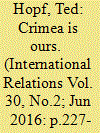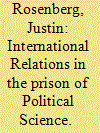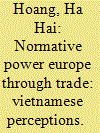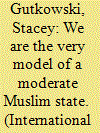|
|
|
Sort Order |
|
|
|
Items / Page
|
|
|
|
|
|
|
| Srl | Item |
| 1 |
ID:
146006


|
|
|
|
|
| Summary/Abstract |
Russia could have annexed Crimea anytime in the last 25 years. The fact that it did so only in March 2014 is a puzzle. I argue that the predominant discourse of Russian national identity by 2014 made the annexation of Crimea and military intervention in eastern Ukraine both thinkable and natural to Moscow. A history of the discursive terrain of Russia from 1992 to 2014 shows how Russia’s national identity has evolved over the years, both in response to Western inactions or actions and domestic developments. But Russian identity is not a sufficient explanation for Russian behavior in Ukraine. For that, we must pay attention to the event itself: Western support for the Maidan protestors, Western failure to adhere to the February 2014 agreements reached with Moscow on a transitional government in Ukraine with Yanukovych at its head and new elections in November, the presence of disgruntled Russians in Ukraine, and perhaps most important, over a decade of US unilateralism in foreign affairs.
|
|
|
|
|
|
|
|
|
|
|
|
|
|
|
|
| 2 |
ID:
146002


|
|
|
|
|
| Summary/Abstract |
In recent decades, the discipline of International Relations (IR) has experienced both dramatic institutional growth and unprecedented intellectual enrichment. And yet, unlike neighbouring disciplines such as Geography, Sociology, History and Comparative Literature, it has still not generated any ‘big ideas’ that have impacted across the human sciences. Why is this? And what can be done about it? This article provides an answer in three steps. First, it traces the problem to IR’s enduring definition as a subfield of Political Science. Second, it argues that IR should be re-grounded in its own disciplinary problematique: the consequences of (societal) multiplicity. And finally, it shows how this re-grounding unlocks the transdisciplinary potential of IR. Specifically, ‘uneven and combined development’ provides an example of an IR ‘big idea’ that could travel to other disciplines: for by operationalizing the consequences of multiplicity, it reveals the causal and constitutive significance of ‘the international’ for the social world as a whole.
|
|
|
|
|
|
|
|
|
|
|
|
|
|
|
|
| 3 |
ID:
146003


|
|
|
|
|
| Summary/Abstract |
The main significance and novelty of the Intervention Brigade established by the United Nations (UN) Security Council in March 2013 in the Democratic Republic of the Congo have previously been attributed to its robust mandate, enhanced capacities and offensive concept of operations. At the tactical, strategic and doctrinal levels of analysis, the Brigade could be considered a continuum of the robust and technological turn of UN peacekeeping, which has continued for more than a decade and is reinvigorated in the so-called new generation of peacekeeping tactics outlined in the New Horizon document. However, this article argues that the most profound significance and novelty of the Brigade reside at the underlying paradigmatic level, which has been ignored in the previous literature. The Brigade embodies not only robust capacities and mandate (peacekeeping with muscles) but also a new peacekeeping paradigm, namely, sovereignty-building (peacekeeping for body politic). The sovereignty-building paradigm is aimed at creating or strengthening the positive and negative sovereignty of the host government. The Brigade reinforces the positive sovereignty of the Congolese government by boosting its self-directive domestic and foreign policy, political will, ownership and responsibility vis-à-vis its regional peers, for example, by making its exit strategy conditional on the Congolese own Rapid Reaction Force. With regard to negative sovereignty, the Brigade contributes to the reinstatement of territorial integrity and supreme state authority by neutralising militia groups.
|
|
|
|
|
|
|
|
|
|
|
|
|
|
|
|
| 4 |
ID:
146004


|
|
|
|
|
| Summary/Abstract |
This article considers the perception of Normative Power Europe (NPE) through the eyes of Vietnam, measuring the degree to which an actor can successfully pursue a normative foreign policy. This article attempts to demonstrate that discussion on the European Union’s (EU) normative identity should include an investigation into the external perceptions of the EU. To become an NPE, the EU’s external partners should recognise it as a holder of norms and values, appreciate its role as a norm-diffuser and perceive the attractiveness of its norms. Semi-structured interviews were conducted with Vietnamese government officials with professional experience in the field of trade relations with the EU to assess non-EU state elites’ perceptions of the EU’s identity. Vietnam’s policy-makers tend to acknowledge the norms that constitute the EU’s normative foundation, with particularly high consensus on those concerning economic liberalism. The EU’s economic and social norms are to some extent attractive for Vietnam and thus able to be adopted and adapted to the Vietnamese context.
|
|
|
|
|
|
|
|
|
|
|
|
|
|
|
|
| 5 |
ID:
146005


|
|
|
|
|
| Summary/Abstract |
Despite its significance to one of the most problematic discursive binaries of the ‘War on Terror’, moderation has been a largely taken for granted theoretical and empirical category in the discipline of International Relations. To prompt further conversation, this article examines ‘Islamic moderation’ as part of Middle Eastern states’ nation branding in the decade and half since 9/11, using Jordan as a case study. I argue that while Jordan’s official and state-endorsed civil society efforts to promote ‘moderate Islam’ and interfaith dialogue stem in part from authentic interest in promoting dialogue and peace, the Jordanian Hashemite regime has also used the Amman Messages to deepen political trust with the United States, attempting to instrumentalize the moral authority of religion as a form of state productive power. It has done so by playing on a myth of religious moderation which has resonated in both the Middle East and the West since 9/11.
|
|
|
|
|
|
|
|
|
|
|
|
|
|
|
|
|
|
|
|
|